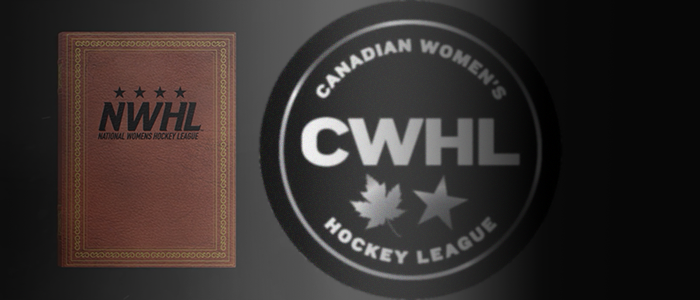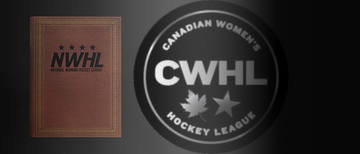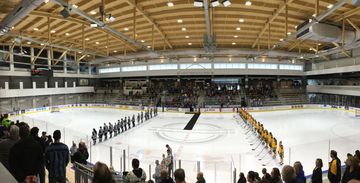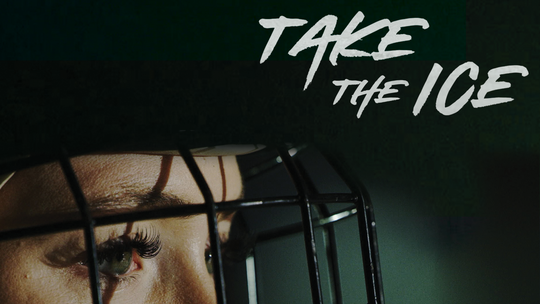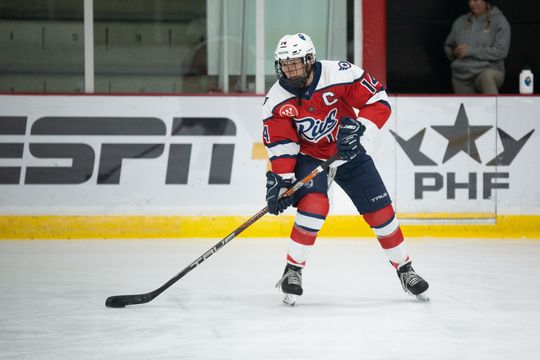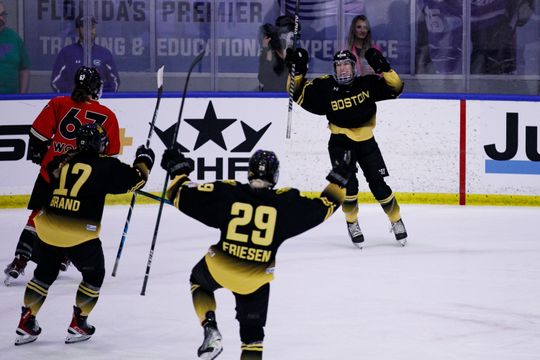In Part I, we looked at the brief histories of the CWHL and NWHL, and the accusations against the NWHL, as well as the public image of NWHL commissioner Dani Rylan. If you're not familiar with women's hockey or the current climate around the CWHL and NWHL, you should definitely read that article first.
Part II will look at the potential for an inter-league outdoor game on New Year's Eve, and why this opportunity is a watershed moment in women's hockey history -- whether it happens or not.
Not Prehistory
When the new NWHL was announced and the CWHL seemed less than pleased, a lot of fans were taken aback. Sure, it's competition, but how could they be so angry? Had they just gotten used to being the only game in town?
In reality, I don't think that this was the case. I think the CWHL was both frustrated and scared, because they'd seen it all before.
The original NWHL, which lasted eight years from 1999 to 2007, had similar goals to the CWHL, which also, at this point, has been around for about eight years. They wanted to pay the players, and they were able to get some of their games on national television in Canada; on big networks, too, like TSN and CBC. In the original NWHL, teams also had owners, which is something that the new NWHL has expressed interest in having as well. The CWHL's teams all fit under the umbrella of the league and all work cooperatively.
This is because the costs of skating independent teams had become prohibitive, and there was no true organizing body in the NWHL to deal with governance, fairness, and parity. And the debate of whether to treat women's hockey as a business or as a cause was already old news.
A December 2006 article, archived from the Montreal Gazette, shows the mindset of many team owners before the NWHL had to fold in 2007. A team called the Quebec Avalanche was owned by Vinnie Matteo:
"You can't look at this as a business. It's a cause," said Avalanche owner and businessman Matteo, who doesn't recoup the approximately $85,000 he spends each year to ice his team. Matteo is a volunteer, as are league coaches, managers and therapists.
For the NWHL to become a paying proposition for the players, the gate must become a bigger source of revenue, and owners will have to find creative ways to get fans in the stands.
One problem for the Avalanche is they don't have a facility to call their own, which makes building a stable fan base and attracting sponsors difficult. This year they'll play many games out of the Collisee Laval, and Matteo has also adopted a nomadic strategy, criss-crossing the island to play promotional games in arenas big and small.
The owners "went on strike" (according to CWHL commissioner Brenda Andress) in 2007, and around the same time, a planned merger with the WWHL failed, supposedly due to scheduling conflicts and travel costs -- but at the time, many media sources were already referring to the WWHL as part of the "Western Division" of the NWHL.
When the Eastern Division ceased operations, and owners complained in the press about the lack of parity and organization:
The chief issue, according [Oakville Ice owner Brian Metcalfe], is the mechanism for distributing talent.
Currently, every player becomes a free agent at the end of every season, meaning they can join any team they wish. Metcalfe said the existing free-for-all disrupts the league's competitive balance.
"Everyone just can't be a free agent," he said. "It's impossible. You can't build anything."
While this was only nine years ago, many of the proposals mentioned in this article to increase the marketability of the women's game sound woefully outdated and sexist. Allow more checking and fighting, make the players take off their face masks to attract men to the stands? The fork in the road could have led us down the path of something like the Legends Football League. Instead, the league that required some players to pay upwards of $1500 to play each year folded. Instead, we got the CWHL, and the CWHL is, in contrast, an immense triumph.
The league has proceeded with an abundance of caution, but it still swiftly began resolving many of the issues that drove the NWHL into the ground. It has slowly amassed sponsors and built relationships with NHL teams. Criticisms about its failure to successfully market the game as an exciting sport and salable product are valid, but its retreat to "wholesome fun for the whole family" as a strategy is a far cry from the commentary of previous owners of NWHL teams, which were laced with concerns about violence and sex appeal. That old-school paternalism could still be hanging over women's hockey like a black cloud. If the sport under the care of the CWHL hasn't eliminated paternalism entirely, it's still decades in the future, spiritually, from where the old NWHL was before.
Regular rinks, corporate sponsors, real playoff hockey on national Canadian television, jerseys with nameplates, online statistics, live streaming, and partnerships with some of the best hockey franchises in history. It's not perfect, but they pulled it off. The CWHL was always a player-based initiative, and it has been careful in building itself, step by step.
But the dust never really settled, especially in terms of the American players, as I discussed in Part I. Enter the new NWHL, and its gutsy, assertive campaigns to do more. Pay the players -- not in a few years, but right away. Live-stream every game. Take marketing, social media, and the sport's public image to the next level. In the context of the history of post-collegiate women's hockey, the NWHL's appearance was shockingly sudden and a massive departure from the methodical pace that the CWHL had used for years to build its connections and cachet. What's more, that immeasurable metric of "fan buzz" was at a fever pitch. The impetuousness and the context were lost on many American hockey fans, myself included. The CWHL had started from literal wreckage. The NWHL was playing with house money and didn't even have to stop to see the wreck on its way to collect its winnings.
When the CWHL issued its press release about the founding of the new NWHL, you can kind of read between the lines and guess what they might have been thinking. Don't ruin this. Don't accidentally threaten everything we've accomplished. Don't screw this up.
The (Untraveled) Road to Foxborough
Someone made a mistake.
On December 5th, Elliotte Friedman went on camera on Sportsnet and announced that Les Canadiennes de Montreal, the CWHL's Montreal team, and the NWHL's Boston Pride, would play an outdoor game at Gillette Stadium on New Year's Eve, as part of the NHL's Winter Classic festivities, leading up to the Canadiens vs. Bruins game on New Year's Day.
Since then, there has been no official word from either league, and the stories coming out haven't clarified anything. In fact, all we really know is that the prominent members of Team USA who play on the Boston Pride and make them such an offensively gifted team apparently won't be able to play in this game, if it is actually played at all, since it conflicts with a previously scheduled Team USA camp. This camp takes place in late December every year ahead of the Women's World Championships, which will be played this year in Kamloops, British Columbia.
I've called this the "ultimate olive branch" -- especially since the Pride has many of the players who left the Boston Blades to join the NWHL. But New Year's Eve is less than two weeks away, and the story becomes less clear with each passing day.
- December 5-6: initial reports from The Hockey News, Yahoo! Sports, and the initial post about this here at The Victory Press
- December 11: Ken Campbell drops a bombshell in The Hockey News when he states that the NWHL lobbied the NHL to make the game between Les Canadiennes and the Boston Pride, as opposed to the Boston Blades of the CWHL. This directly conflicts with my own experience with these rumors, which have included both leagues going back to early November, and have also come from sources close to the CWHL. However, if anything was planned prior to that, it hasn't been included in any reports. It is also reported that while players are able to skip the Team USA camp, doing so may bar them from competing in Kamloops. In addition, Campbell hints at an official comment from Dani Rylan, which was supposed to be coming on December 14, per a league spokesperson. This comment never came. Campbell:
This, of course, raises the question as to how such a blunder could have occurred in the first place. A source close to the CWHL said the league originally had an understanding with the NHL to provide two of its teams –- the Canadiennes and the Boston Blades –- for the outdoor game, a plan that changed only recently when a source said that a lobbying effort by the NWHL to the NHL prompted a change in plan to allow the Boston Pride to replace the Blades in the outdoor game. A spokesperson for the NWHL said Rylan has no comment, and will have a statement on the status of the game on Monday.
One possible scenario would see the Pride round out its roster with players from other NWHL teams with New England roots, something it’s believed the CWHL does not support. It is not known whether the CWHL would withdraw its participation from the game, but it’s clear that the Canadian league is not pleased with the most recent development. A source close to the CWHL said the league is waiting to see what will be planned for the game before it makes any official announcements.
- December 14: The Boston Globe reports that the Pride will replace its players with players from other NWHL teams who have a tie to the Boston area. This is not reported elsewhere or confirmed.
Both the CWHL and NWHL have opted to go the "no comment" route when inquiries are made about the game, and the longer that goes on, the more uneasy the situation becomes.
If Friedman never announced the game on TV, of course, none of this would have happened. With the door kicked open, that can't be taken back. I can't decide if it would have been better to leave this unsaid, and then have it come out later that the NWHL and/or CWHL failed to bring the idea to fruition. Both look bad right now, but the NWHL looks worse -- especially if that rumor about lobbying the NWHL to have the Blades removed from the game turns out to be true, and that turns out to be what set off this saga with USA Hockey.
Something will have to change -- either that, or we lose the game. Or, the game could go on, and be a disaster. The CWHL, NWHL, and NHL all have two weeks to save it. Without the Boston/Montreal rivalry, it'll lose a portion of its marketability on this stage, but the game could still be re-imagined to involve available players from both leagues as a kind of mini All-Star Game. The solution that Campbell mentions, to fill in the Pride roster with non-Pride players, seems sloppy. In fact, any proposed solution, including the participation of Team USA's players, would seem sloppy -- we'd likely wait until March to find out if those players were being held out of the Women's Worlds, and then the rumors and vitriol would start all over again.
Here, the news cycle failed women's hockey, and women's hockey failed the news cycle. It's hard to tell who is most at fault, since we don't know whose idea this was, when it was proposed, or if it is even a real thing.
However, the CWHL is much better equipped to weather this storm. Without a women's exhibition game, we still get the exact same Winter Classic that we've been enduring for years, so the NHL will be fine (all of its other problems notwithstanding). The NWHL has the most to lose in terms of reputation, and the entire sport of women's hockey is risking negative press and (pardon my language) paternalistic bullshit from men in positions of power, who will be sure to either hint or simply say outright that women's hockey is not ready for the biggest stages.
If you're a woman in sports, or really any marginalized group, it eventually becomes clear to you that no one is going to protect you when you do screw up, except yourself. "Don't screw up" is a difficult burden to bear, especially when the bell has already been rung about an event that could change the landscape of your sport forever, and it may have been a complete accident. Many women involved in the CWHL have been down these roads before, though perhaps not on the same scale. They know what it means to take risks and get burned long-term.
This has been going on in women's hockey, in slow motion, for nearly three decades. We can take the "slow motion" part out of it, thanks to social media, and it's not just getting burned: it can be a fucking wildfire.
I hope the leagues can save the game. Women's sports shouldn't have to prove everyone wrong. But it still feels pretty amazing when, time and time again, they do it anyway.
The NWHL did not respond to a request for comment about the outdoor game for this article.
